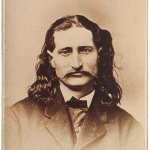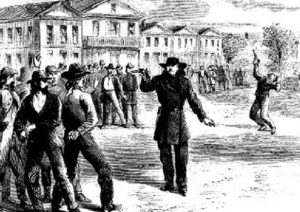European chivalry
 When we think of the Old West, cowboys, Indians, and outlaws come to mind…not to mention showdowns, or what might have been known as a duel, in years gone by. In reality, showdowns were not all that common…no matter what Hollywood tries to tell you. The men and women who went west were a tough bunch. In the beginning, it was mostly men who went west, and since there was no law in the West, altercations were bound to happen. Still, altercations that led to a showdown were not all that common. Rather than coolly confronting each other on a dusty street in a deadly game of quick draw, most men began shooting at each other in drunken brawls or spontaneous arguments. Ambushes and cowardly attacks were far more common than noble showdowns, but those who took the noble approach were far more respected.
When we think of the Old West, cowboys, Indians, and outlaws come to mind…not to mention showdowns, or what might have been known as a duel, in years gone by. In reality, showdowns were not all that common…no matter what Hollywood tries to tell you. The men and women who went west were a tough bunch. In the beginning, it was mostly men who went west, and since there was no law in the West, altercations were bound to happen. Still, altercations that led to a showdown were not all that common. Rather than coolly confronting each other on a dusty street in a deadly game of quick draw, most men began shooting at each other in drunken brawls or spontaneous arguments. Ambushes and cowardly attacks were far more common than noble showdowns, but those who took the noble approach were far more respected.
Southern emigrants brought to the West a crude form of the “code duello,” a highly formalized means of solving disputes between gentlemen with swords or guns that had its origins in European chivalry. Similar to the duels of times past, they thought it would bring some form of civility to the West. The duel influenced the informal western code of what constituted a legitimate and legal gun battle. Duels were not used to for very long. In fact, by the second half of the 19th century, few Americans still fought duels to solve their problems.  The western code required that a man resort to his six-gun only in defense of his honor or life, and only if his opponent was also armed. Also, a western jury was unlikely to convict a man in a shooting provided witnesses testified that his opponent had been the aggressor.
The western code required that a man resort to his six-gun only in defense of his honor or life, and only if his opponent was also armed. Also, a western jury was unlikely to convict a man in a shooting provided witnesses testified that his opponent had been the aggressor.
In what is thought to be the first western duel, Wild Bill Hickok, killed Davis Tutt on July 21, 1865. Hickok was a skilled gunman with a formidable reputation, who was eking out a living as a professional gambler in Springfield, Missouri. He quarreled with Tutt, a former Union soldier, but it is unclear what caused the dispute. Some people say it was over a card game while others say they fought over a woman. Whatever the cause, the two men agreed to a duel. The showdown took place the following day with crowd of onlookers watching as Hickok and Tutt confronted each other from opposite sides of the town square. When Tutt was about 75 yards away, Hickok shouted, “Don’t come any closer, Dave.” Tutt nervously drew his revolver and fired a shot that went wild. Hickok, by contrast, remained cool. He steadied his own revolver in his left hand and shot Tutt dead with a bullet through the chest. Hickok immediately turn and threatened Tutt’s friends…should they try to avenge his death.

Having adhered to the code of the West, Hickok was acquitted of manslaughter charges. Nevertheless, those were rough times, and just eleven years later, Hickok died in a fashion far more typical of the violence of the day. A young gunslinger shot him in the back of the head while he played cards. Legend says that the hand Hickok was holding at the time of his death was two pair…black aces and black eights. The hand would forever be known as the “dead man’s hand.” Jack McCall shot Hickok from behind as he played poker at Nuttal & Mann’s Saloon in Deadwood, Dakota Territory on August 2, 1876. In one shooting is honor, and in another is a dishonor. McCall was executed for the murder on March 1, 1877.

